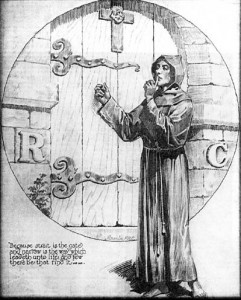Salient Thoughts in Concise Form for Students
By Dr. S.G. Eghian
(The Rosicrucian Brotherhood –Volume II-1908)
“Because straight is the gate and narrow is the way which leadeth unto life, and few there be that find it”
The Rosicrucian Society instituted in the fourteenth century was an extraordinary Brotherhood, exciting curiosity and commanding attention and scrutiny. The members delved in abstruse studies: many became anchorites, and were engrossed in mystic philosophy and theosophy. This strange Fraternity, asserted by some authorities to have been instituted by Roger Bacon near the close of the thirteenth century, filled the world with renown as to their incomprehensible doctrines and presumed abilities. They claimed to be exponents of the true Cabala, as embracing theosophy as well as the science of numbers. They are said to delve in strange things and deep Mysteries; to be enwrapped in the Occult Sciences, sometime vulgarly termed the “Black Art”; and in the secrets of Magic and Sorcery, which are looked upon by the critical eyes of the world as tending to the supernatural, and a class of studies to be avoided.
These Mystics, for whom great philanthropy is claimed, and not without reason, are heard of as early as the commencement of the fourteenth century in the person of Raymond Lully, the renowned scholiast and metaphysical chemist, who proved to be an adept in the doctrines taught at the German Seat of Hermetic Learning in 1302, and who died in 1315. Fidelity and Secrecy were the first care of the Brotherhood. Claimed a kinship to the ancient philosophies of Egypt, the Chaldeans, the Magi of Persia, and even the Gymnosophists of India. They were unobtrusive and retiring in the extreme. They were learned in the principles and sciences of Chemistry, Hermeticism, Magnetism, Astrology, Astronomy, and Theosophy, by which they obtained great powers through their discoveries, and aimed at the universal solvent – the Philosopher’s Stone – thereby striving to acquire the power of transmuting baser metals into silver and gold, and of indefinitely prolonging human life. As a Fraternity they were distinct from the Cabalists, Illuminati, and Carbonari, and in this relation they have been largely and unpleasantly misrepresented. Ignorance and prejudice on the part of the learned as to the real purposes of the Rosicrucians and as to the beneficence of that Fraternity has wrought them great injustice. Science is infinitely indebted to this Order. The renowned reviver of Oriental literature, John Reuchlin, who died in 1522; the famous philosopher and classic scholar, John Picus di Mirandola, who died in 1484; the celebrated divine and distinguished philosopher, Cornelius Henry Agrippa, who died in 1535; the remarkable chemist and physician, John Baptist Von Helmont, who died in 1644; and the famous physician and philosopher, Robert Fludd, who died in 1637, all attest the power and unquestioned prominence of the famous Brotherhood. It is not the part of wisdom to disdain the Astrological and Hermetic Association of Elias Ashmole, author of the “Way to Bliss.” All Europe was permeated by this secret organization, and the renown of the Brotherhood was pre-eminent about the year 1615. Wessel’s “Fama Fraternitatis,” the curious work “Secretioris Philosophiae Consideratis,” and “Cum Confessione Fraternitatis,” by P. A. Gabella, with Fludd’s “Apologia,” the “Chemische Hochzeit of Christian Rosenkreuz,” by Valentine Andrae; and the endless volumes, such as the “Fama Ramissa,” establish the high rank in which the Brotherhood was held. Its curious, unique, and attractive Rosaic doctrines interested the masses of scholars of the sixteenth and seventeenth centuries. With the Rosicrucians worldly grandeur faded before intellectual elevation. They were simple in their attire, and passed individually through the world unnoticed and unremarked, save by deeds of benevolence and humanity.
The Modern Rosicrucians
The Modern Society of Rosicrucians was given its present definite form by Robert Wentworth Little, of England, but a few years ago; it is founded upon the remains of the embers of an old German association which has come under his observation during some of his researches. Brother Little Anglicized it, giving it more perfect system, and placing it in that condition in which it was received in the United States.
The purpose of Robert Wentworth Little was to create a literary organization, having in view a base for the collection and deposit of Archaeological and Historical subjects pertaining to Freemasonry, Secret Societies in general, and interesting provincial matter; to inspire a greater disposition to obtain historical truth and to displace error; to bring to light much in relation to a certain class of scientists and scholars, and the results of their life labors, that were gradually dying away in the memories of men. To accomplish this end he called about him some of his most prominent English and Scottish Masonic friends inclined to literary pursuits, and they awarded their approval and hearty co-operation.
The Rosicrucian Societies for England and for Scotland were immediately established; and in 1876 the Order was planted in the Dominion of Canada by authority of Prince Rhodokanakis, of Greece, in which latter country it had been introduced from England. It was introduced and organized in the United States in 1879. The Society also exists in Ireland, in Tunis, in China, in India, and New Zealand.
_______________________________________
“FlensqiouredaV. Hoc est Redintegratio,” addressed to “The Brotherhood of the Rosie-Cross,” appeared in 1619, with the motto, Omne de Saba veniut, aurum et thus deferentes, et laudem Domini annunciantes, with the following lines prefaced:
O Rosae Fratres crucis, O pia turba sophorum,
Vestro praesentes esse favore mihi.
Fama velut cunctis vos respondere paratos
Exhibet. Ah ne sint irrita vota precor.
Fidus amicus ero, fidos quoque gestit amicos
Mens mea de musis conciliare novem.
At, si scripta fient quaedam minus apta, fllabello
Fratrum non Momi sint abigenda, pio.
Usus enim Famae potoiri ex parte loquelis
Fratres propitios hinc mage spero mihi.

